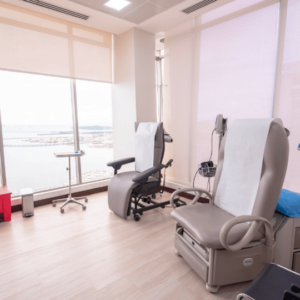
Multiple sclerosis (MS) can have a major impact on your life. From your speaking ability to your muscle control, it can affect your mobility and drastically limit your daily activities. Stem cell therapy for MS may provide relief and an opportunity for improving your lifestyle.
MS is a central nervous system-related autoimmune disease affecting your spinal cord and brain. Stem cell therapy from Stem Cell Institute in Panama is a safe treatment option that may be able to improve symptoms associated with the disease. Once your application has been approved, a staff physician will develop a treatment protocol that best suits your needs and current health.
What Is Multiple Sclerosis?

MS is a chronic autoimmune disease that affects the central nervous system. Like other autoimmune diseases, it can have a far-reaching impact on your overall health, including your:
- Balance
- Coordination
- Muscle control
- Speech
- Vision
These effects are caused by inflammation, damage to the spinal cord, and damage to the brain. This interferes with the body’s natural nerve signals resulting in symptoms of the disease. Symptoms and their severity can vary from person to person with some only having mild symptoms. Those with more severe cases may not be able to perform daily tasks.
There are two forms of MS that we treat at Stem Cell Institute in Panama:
- Relapsing-remitting MS (RRMS)
- Secondary-progressive MS (SPMS)
Relapsing-remitting MS is the more common of the two. Patients will experience days or weeks of relapsing MS where symptoms become worse or they may develop new ones. These relapses are followed by periods of remission in which their symptoms get better or even disappear completely. These periods can last months and sometimes even years.
Secondary-progressive MS occurs among 20% – 40% of those who have relapsing-remitting MS. In these cases, patients experience a gradual progression of their symptoms within 10 – 20 years of developing the disease. This can also occur without having phases of relapse and remission.
Watch the video to see how stem cell treatment for MS changed Adam’s life!
Stem Cell Therapy for MS
MS doesn’t have a cure. However, treatments have been developed to help mitigate symptoms including:
- Increase recovery time from attacks
- Reduce relapses
- Manage symptoms
- Reduce disease activity
Stem cell therapy for MS is an alternative therapy that seeks to prevent the immune system from attacking the body. According to the results of one of our clinical trials, patients who underwent stem cell treatment for MS showed improvement in dysfunctions associated with their:
- Bladder
- Bowels
- Legs
- Upper extremities
- Energy levels
The study also found that no adverse events were reported by patients. Patients also showed an improved score on the Expanded Disability Status Scale (EDSS)—a test that scores before and after treatment.
Click here to learn more about the use of stem cells in treating multiple sclerosis!
What to Expect During Treatment

Stem cell treatment protocols can vary from patient to patient. Our experienced team of staff physicians will develop a treatment protocol tailored to your needs once you have been evaluated and approved.
Below is a sample treatment protocol to learn what to expect during stem cell therapy for MS:
- Treatment length: 5 nights
- Physical examination and blood testing: Day 1
- 3 intravenous infusions + perilymphatic injections of Golden Cells™ (human umbilical cord tissue-derived allogeneic mesenchymal stem cells): Days 2 – 4
- 2 physical therapy sessions
To learn more about our intake and treatment process, click here!
What are Stem Cells?
The vast majority of cells in your body serve a specific function, such as immune cells or nerve cells. These are known as specialized cells.
Stem cells, on the other hand, haven’t been assigned a specific role within the body. These unspecialized cells have the potential to become whatever type of cells are needed. They may even help repair damage within the body and restore it to a more healthy state.
Sources of Stem Cells
Stem cells can be gathered from a number of places in the body including:
- Bone marrow
- Peripheral blood
- Fat
- Umbilical cord tissue and blood
- Placental tissue
Once collected, these cells are sent to our lab for processing and assessment. Once overcoming our rigorous quality control process, they can be transplanted back into the patient to treat different ailments.
Human Umbilical Cord Tissue Mesenchymal Stem Cells
Mesenchymal stem cells (HUCT-MSCs) are found in the umbilical cords of newborn babies. They are considered adult stem cells since they are postnatal cells.
At Stem Cell Institute, we use HUCT-MSCs that have been separated from umbilical cord tissue. They form the basis for the specialized Golden Cells™ developed by Dr. Neil Riordan, PA, Ph.D. under the strictest guidelines.
Mesenchymal stem cell therapy is known to help:
- Reduce inflammation
- Modulate the immune system
- Regenerate tissues throughout the body
One of the most important facts to understand about mesenchymal stem cells, including Dr. Riordan’s Golden Cells™ is that they are often referred to as medicinal signaling cells due to their unique ability to communicate with surrounding cells and tissues. Think of them as tiny messengers traveling through the bloodstream, seeking out areas of damage or inflammation.
When they arrive at their destination, they release powerful chemicals that stimulate healing and regeneration. This process was first discovered by Arnold Caplan, PhD, who coined the term “medicinal signaling cells” to describe the therapeutic potential of MSCs.
Dr. Caplan is a tenured professor of biology at Case Western Reserve University. He is commonly known as “The father of the mesenchymal stem cell.” Dr. Caplan is also a patient at the Stem Cell Institute in Panama.
Bone Marrow Stem Cells
First discovered in the 1960s, bone marrow stem cells are the most studied of all the different types. They were originally used in hematopoietic stem cell transplantation to treat issues such as:
- Leukemia
- Lymphoma
- Sickle cell disease
However, their use has been studied to treat the following conditions with mixed results:
- Vascular disease
- Diabetes
- Heart failure
Bone marrow cells are no longer used in our treatment protocols. In our 15+ years of experience, we have observed that these cells produced inferior results for the conditions we treat compared to the Golden Cells™ we currently use.
Adipose Stem Cells
Adipose stem cells are derived from body fat. Over a decade ago, they were successfully used in treating horses and companion animals for joint and bone injuries. Unlike bone marrow, adipose tissue is rich in mesenchymal stem cells as well as T cells to support the immune system. This makes adipose-derived MSCs a candidate for treating autoimmune disorders and inflammatory issues, albeit not the most ideal one.
Over a decade ago, Stem Cell Institute pioneered the use of adipose stem cells to treat a number of health problems including:
- Osteoarthritis
- Rheumatoid arthritis
- Multiple sclerosis
However, further research revealed that HUCT-MSCs were superior. Since then, we have focused on using the Golden Cells™ developed by Dr. Riordan.
Do you want to learn more about the possibilities of stem cell therapy? Apply for treatment today!
MS is an autoimmune disease related to the central nervous system that affects the brain and spinal cord. Studies have shown that stem cells may be able to improve symptoms associated with the condition and that it’s perfectly safe. You’ll need to apply for treatment and be approved. Once completed, a staff physician will develop a personalized treatment protocol just for you.
Stem Cell Institute in Panama City, Panama is at the forefront of applied stem cell research. Since our inception in 2006, we have performed over 25,000 procedures, helping thousands of families across the United States and around the world embrace the opportunity for a better life. Our medical team prioritizes the health and well-being of all our patients through top-notch stem cell treatment and care.
For more information visit: www.cellmedicine.com
